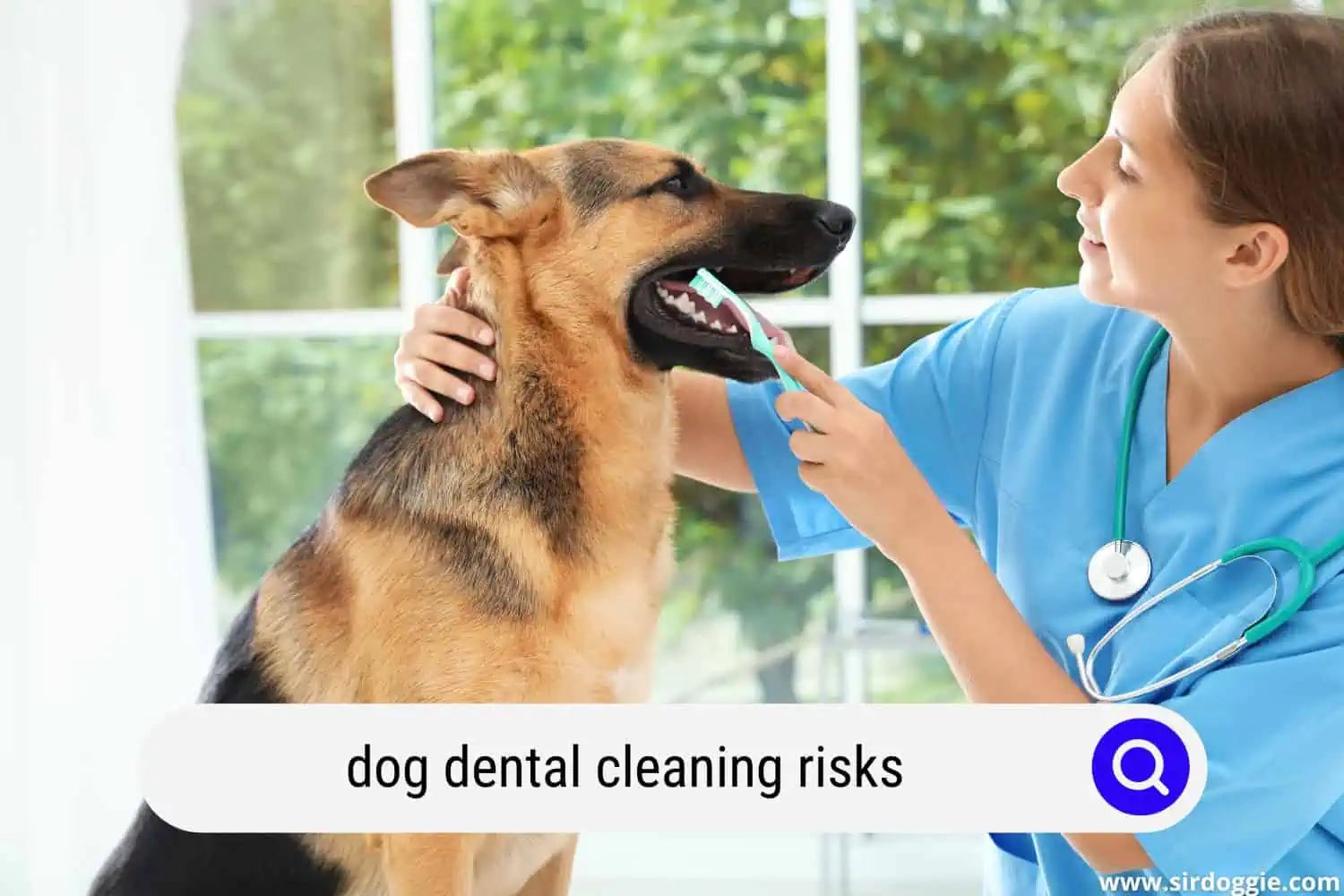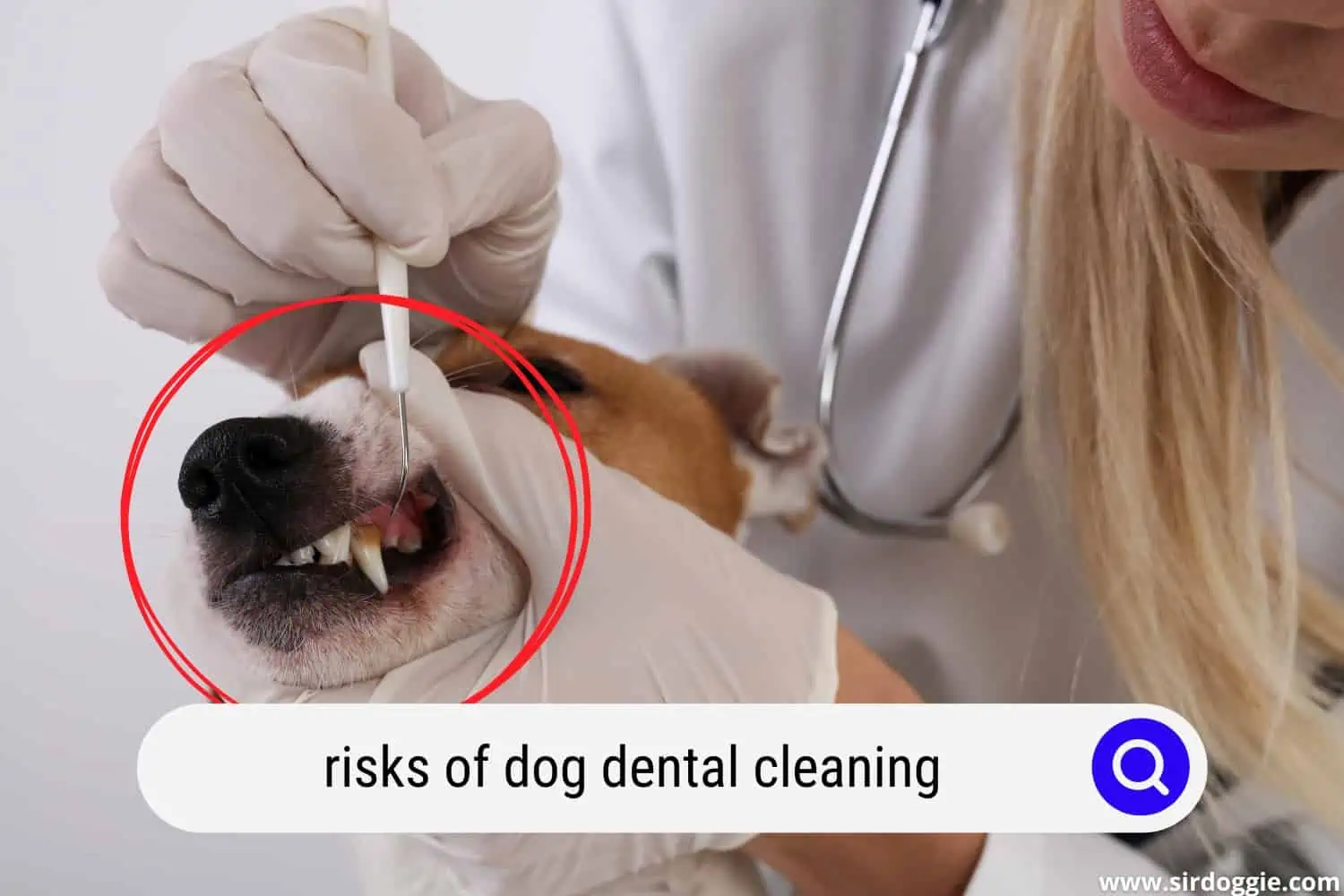Dog Dental Cleaning Risks
Dental health is as important for dogs as it is for humans, but some owners are worried about possible dog dental cleaning risks as no one wants to hurt their dog if we’re trying to help them. If you ask any vet in the world about it, you’ll learn that your dog’s health must take care of their teeth.
However, many owners forget about this completely and they disregard their dog’s dental health completely. In today’s article, we’ll be taking a look at the most common method of upkeeping your dog’s dental health and the risks involved.

Dog Dental Health – How Important Is It?
Even though many people don’t realize it, the teeth of your dog aren’t much different from your own, at least regarding how often they need to be cleaned. You absolutely should provide frequent care to your dog’s teeth, and if you ignore that part of their life they’ll just have more problems down the road.
The foods we give to our dogs today can’t provide them with the natural flossing they used to get from wild game. It appears that more than 80% of dogs nowadays are showing clear signs of oral disease by the time they’re three years old.
This is terrible news, as it shows that 80% of dog owners don’t take proper care of their pets’ dental health!
You can recognize dental disease in dogs by bad breath (a dog’s breath shouldn’t be worse than your own), excess salivation, and a loss of appetite. If the disease gets bad, they can lose weight and even develop swelling in the face.
Methods Of Dental Cleaning
Luckily, there are numerous methods you can employ to ensure that your dog’s teeth are clean, starting with the most obvious one.
Brushing Your Dog’s Teeth
This method is the most effective when it comes to keeping your dog’s teeth healthy. It’d be best to brush their teeth daily, but twice a week should still be enough. You can buy toothbrushes and toothpaste, both made for dogs, at your local vet’s.
It’s best not to brush your dog’s teeth with brushes and pastes made for people as they can be painful and toxic to the dog.
Additionally, remember that your dog will dislike brushing their teeth at first, which is why these pastes are made in likable flavors. That way, it’ll be easier to get them on board with the brushing.
Dental Chews
Many different types of dental chews are supposed to clean your dog’s teeth. Some of them are better than others, but the principle is essentially the same.
These treats or toys have ridges that are supposed to get in between your dog’s teeth and clean the plaque. Some of these chews are actual snacks that your dog will bite into, chew and swallow.
Other chews are toys – there are even biting toys that your dog will have to actively bite for the toy to release dog toothpaste to clean its mouth. These toys are very useful as they essentially make sure that your dog is brushing its teeth!
Veterinary Cleaning
Many vets provide the service of cleaning your dog’s teeth, usually to a very high degree. It’d be great if you took your dog to these cleanings every once in a while, just make sure to consult the vet first.
Related Reading: Why Are My Pug’s Teeth Falling Out?!
Dog Dental Cleaning Risks
Understandably, some owners are worried about the possible risks involved with cleaning dog teeth. Is it possible for a dental stick to cut the dog’s mouth or somehow rip a tooth out? While completely rational thoughts, these incidents are almost impossible.
The only real risk, in truth, is the risk of putting your dog under general anesthesia when you’re having its teeth cleaned at the vet’s.
Anesthesia is a risk in general, with all animals, but anesthesia, as we know it today, is mostly safe for your dog. The risk of not cleaning your dog’s mouth and developing dental disease is much greater than that of your dog not waking up from anesthesia.
Additionally, vets remind us that keeping your dog’s teeth clean by brushing them and using dental sticks will prevent the buildup of plaque, basically ensuring that you don’t have to take your dog for dental cleaning.
In this regard, it’s also smart to take care of your dog’s diet – choosing food and treats with the label VOHC (meaning: Veterinary Oral Health Council) ensures that the food isn’t detrimental to your dog’s dental health!

To End
The dental health of your dog is just as important as any other part of their general health, and it’s normal to worry about risks with teeth cleaning. However, complications from dog dental cleaning are incredibly rare.
With the biggest, and only, threat being anesthesia – and the case of a dog not waking up from one being extremely rare – it’s generally safe to take your dog to the vet to clean their teeth. Make sure to do some cleaning at home, though, and that way you can eliminate the need for the vet!
FAQ
Are dog dental cleanings safe?
Yes, a vet cleaning your dog's mouth in detail is in general very safe. The vet will typically take an X-ray of your dog's mouth before they even begin the process to ensure maximum safety. It's never in the interest of the vet to harm your dog.
What are the risks of having your dog’s teeth cleaned?
The biggest risk is anesthesia. Forcefully inducing sleep isn't exactly natural and the body can react badly to it. However, cases of dogs not waking up from general anesthesia are very rare, just like with humans, so it's not something that you should worry about.
It is worth getting my dog’s teeth cleaned?
It's absolutely worth it! Having unhealthy teeth is terribly detrimental to your dog's general health and they can develop serious issues with their diet and their general health because of this. If you don't take care of their teeth regularly, you'll definitely have to get their teeth cleaned by a vet.

Family Dog Expert Author
Hi there! I’m Stuart, a devoted dog lover and family dog expert with over a decade of experience working with our furry companions. My passion for dogs drives me to share my knowledge and expertise, helping families build strong, loving bonds with their four-legged friends. When I’m not writing for SirDoggie, you’ll find me hiking, playing with my beautiful dog, or studying music.